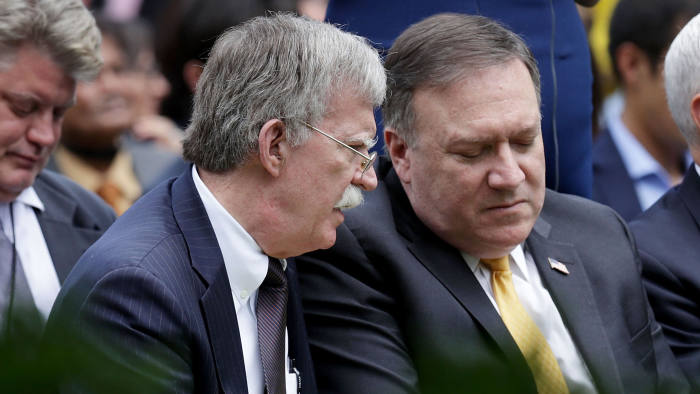US sets course for its next Middle Eastern war of choice
Dick Cheney’s heirs are laying the groundwork for an Iran conflict
Edward Luce

Skilled insiders: John Bolton and Mike Pompeo © Getty
Dick Cheney, the former US vice-president, said that if there was a 1 per cent threat of something happening, America should act as if it were a certainty. By that yardstick, the chances of a US war with Iran are now flashing red. Any such conflict could induce a geopolitical earthquake to exceed what followed the US-led invasion of Iraq.
That war unleashed Isis, empowered Russia and China, and left a bitterly divided America roughly $3tn worse off. In the first Gulf war in 1991, the US led a broad international coalition. By the second one in 2003, the “coalition of the willing” had shrunk to Britain, Spain, Australia, Poland and a handful of Pacific islands. This time, the US would be fighting without any non-Middle Eastern allies.
In the spirit of Mr Cheney, the US should bear in mind parallels between the build up to the Iraq war in 2003 and what is happening today. Much like then, today’s case is led by two highly skilled insiders. John Bolton, the national security adviser, and Mike Pompeo, the secretary of state, are worthy heirs to Donald Rumsfeld and Dick Cheney. They know how to marshal intelligence for their ends.
Each claims that Iran is stoking its proxies in Iraq, Syria, Yemen and Lebanon for imminent attacks on the US and its allies. They have withdrawn non-essential US personnel from Baghdad and ordered the USS Abraham Lincoln aircraft carrier and a bunch of B52 bombers to the region. America would respond with “unrelenting force” to any Iranian attack, said Mr Bolton. US retaliation would be “swift and decisive” says Mr Pompeo.
All that is lacking is clear intelligence to back them up. Chris Ghika, the British major-general who is second-in-command of the US-led anti-Isis coalition, said on Tuesday there was no evidence of an increased Iranian threat. He was slapped down by a US spokesman.
Why tensions are rising in the Middle East: https://imasdk.googleapis.com/js/core/bridge3.305.0_en.html#goog_934100553
After the 2003 Iraq war, it emerged that British and US officials had privately complained of White House “cherry picking” to suit the case for war. One of the crucial claims was that Saddam Hussein was in league with al-Qaeda — a contention that was later debunked. History seems to be repeating itself.
In a testimony to Congress last month, Mr Pompeo implied the US could go to war with Iran today under the original 2001 authorisation. Indeed, the grounds were the same. “There is no doubt there is a connection between the Islamic Republic of Iran and al-Qaeda. Period, full stop,” Mr Pompeo said.
Much like Iraq in 2003, the US is presenting Iran with demands that it knows will be rejected. The timetable for military action is clear. Iran has given Europe’s three powers — France, Britain and Germany — 60 days to salvage the 2015 nuclear deal abandoned by the US. Failing that, Iran will resume uranium enrichment and its nuclear clock would restart. Mr Pompeo is depriving the EU3 of any leeway to keep the deal intact — the cost of US sanctions would be too great. Murkiness over who carried out this week’s attacks on oil tankers near the Strait of Hormuz hints at a wider menu of triggers for US military action.
Which brings us back to Mr Cheney. The Iraq war helped bring America’s unipolar moment to an end. The decade and a half since then has seen the re-emergence of great power rivalry. A war with Iran would risk far more. Saddam Hussein had less than 100,000 bedraggled troops. Iran has up to a million in uniform. Iraq had no credible allies. Iran is a Russian ally and a big oil exporter to China.
A US-Iran conflict would provide cover for Russia and China to further their ambitions. Russia could use the distraction to annex eastern Ukraine, or take a chunk of one of the Baltic states, then dare Nato to eject it. China, meanwhile, could present itself as the level-headed alternative to a rogue superpower.
Such a scenario is by no means outlandish — it is entirely plausible. The alternative path is that Donald Trump fires, or sidelines, Mr Bolton and Mr Pompeo. In that case, the drumbeat for war would fall silent. But that seems less likely. By Mr Cheney’s measure, therefore, the world should take out insurance against America’s next war of choice.
0 comments:
Publicar un comentario